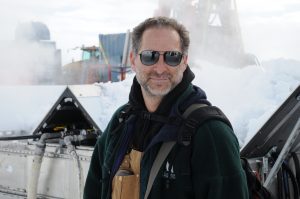Reed Scherer
Northern Illinois University
2021-2022 Distinguished Lecturer
Inferring West Antarctic Ice Sheet history from diatoms offshore, nearshore, downcore and beneath the ice sheet
For more than four decades the paleoceanography community has worked to reconstruct ice sheet history. Similarly, glaciologists and ice sheet modelers have worked to understand ice sheet dynamics and mechanisms of long-term ice sheet growth and decay. Pleistocene history of the West Antarctic Ice Sheet (WAIS) had been particularly difficult to resolve. Mercer (1978, Nature) inferred WAIS collapse during the last interglacial, whereas Kennett (1977, JGR) suggested relative stability of Antarctic ice since the latest Miocene. Interpreting past WAIS collapse events from ocean drilling records requires clearer understanding of the oceanographic drivers as well as the effects of ice sheet retreat. I will discuss recent advances in directly tying Antarctic nearshore and subglacial records with those of the deep sea, with a particular focus on diatoms as tracers, which have provided notable insights. Sediments recovered from subglacial basins (e.g., the WISSARD Project) provide incomplete but direct evidence of marine events in the Antarctic interior. More continuous marginal ocean records (e.g., IODP Expeditions 374 and 379 and the ANDRILL program) provide clear evidence of significant glacial-interglacial changes, but unique signatures of past collapse events are more elusive. Recent advances in glaciological observations and coupled ice sheet/ocean models has brought us to the threshold of more confident forecasting of ice sheet behavior, thus future sea level rise under different CO2emissions scenarios. High resolution paleoceanography is a critical component of assessing the veracity of these models.
Reed Scherer is Board of Trustees Professor and Distinguished Research Professor of Geology & Environmental Geosciences at Northern Illinois University. He’s sailed on two ODP and one IODP expedition to date, plus ten expeditions to the Antarctic continent, including participation in ANDRILL 1B, the Cape Roberts Project and the WISSARD project.
LECTURE SCHEDULE
- March 14, 2022 – Skidaway Institute of Oceanography – University of Georgia, Savannah, VA
- May 25, 2022 – Oregon State University, Corvallis, OR







